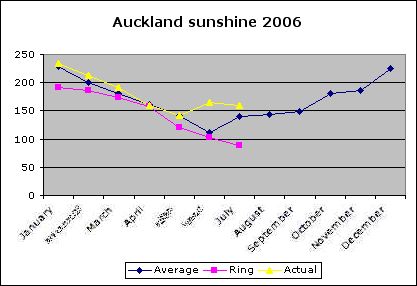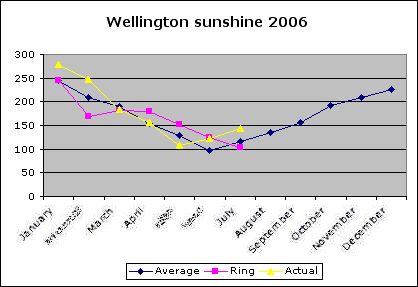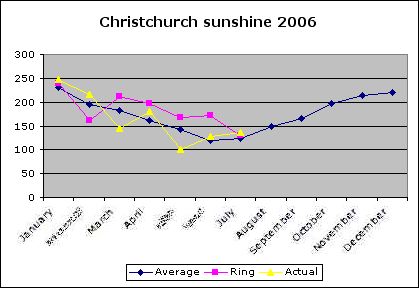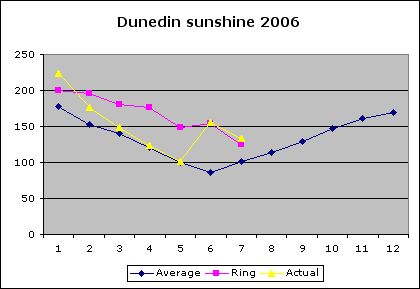[Apologies to anyone who's tried to download the spreadsheet - there was an issue with my file upload. Fixed now.]
The long term averages for monthly sunshine hours show an unsurprising pattern: highest in December/January, lowest in June. There aren't the big positive variances from the mean that we see in rainfall because there is a maximum limit - the day length. On the other hand, it's conceivable that a very cloudy month could have very low - even zero - hours of sunshine, but that would be much more likely (or easily achieved) in winter when days are shorter.
Auckland

Actual sunshine hours track the long term average through until June, which was much sunnier than normal. Ring's "estimates" are low in January, then follow the average through until June - which he therefore gets wrong. He also forecasts that July would be significantly duller than average, but it turned out to be sunnier.
Wellington

Ring's forecasts for the capital are right twice, in March and June. He gets February very wrong, and May and July are only slightly better.
Christchurch

Ring does well in January and July, and not badly in April, but the other months are all well wide of the mark. Since he reckons Christchurch is supposed to be drier than normal, that could explain why he predicted more sun than average from March through to July.
Dunedin

I was surprised to discover that Dunedin only averages 86 hours of sunshine in June (under 3 hours per day). Perhaps that's why the students there seem so fixated on burning sofas in the streets. Heat and light...
Ken is clearly convinced that Dunedin should be having a sunny year. He does well in June and July, and not too badly in January, but as the rest of the year tracks the long term average, he's way out.
So how many city/months can we give him? Being generous, I score him with four hits in Auckland, Wellington and Dunedin and three in Christchurch, for a total of 15 out of 28 - or about 54%. If he had simply predicted the long term average, he'd have been right four times in Wellington and Dunedin, five times in Christchurch, and six in Auckland for a total of 19, or 68%.
Ken's rain and sun forecasts are therefore "right" (or "close enough") about half the time, which is no better - and sometimes worse - than simply predicting that rain or sun in a given location will simply be the same as the long term average for that time. This is hardly a ringing endorsement of Ken's forecasting method, and certainly a long way short of the 80% to 85% accuracy he claims.
Next: how good is Ken at forecasting newsworthy weather events? He claims (Weather Ezine, Sept 3):
"We were quite happy to have gotten most events correct for the 2006 version. p41 lists 12 June "cold wintry blast brings snow to low levels in Canterbury..". We also got the timing of the formation of Cyclones Larry/Wati and Monica, the flooding in the Wairarapa, the good snow amounts at Whakapapa and the low levels in the southern hydrolakes."
Most events? More than half? The flooding in the Wairarapa? Digging into that will provide an interesting perspective on his forecast techniques...
.jpg)


